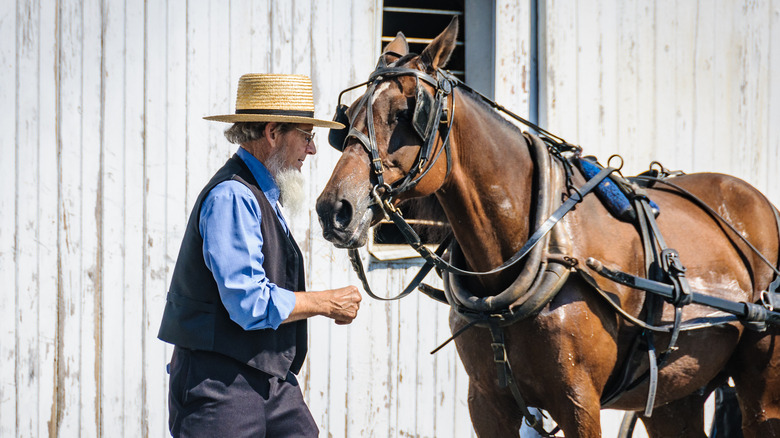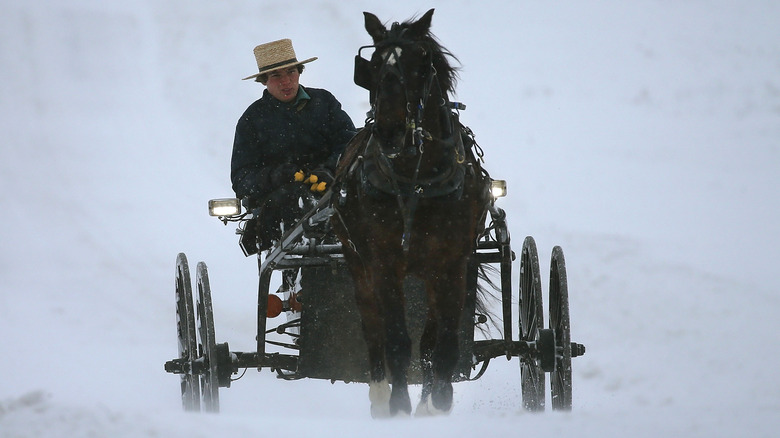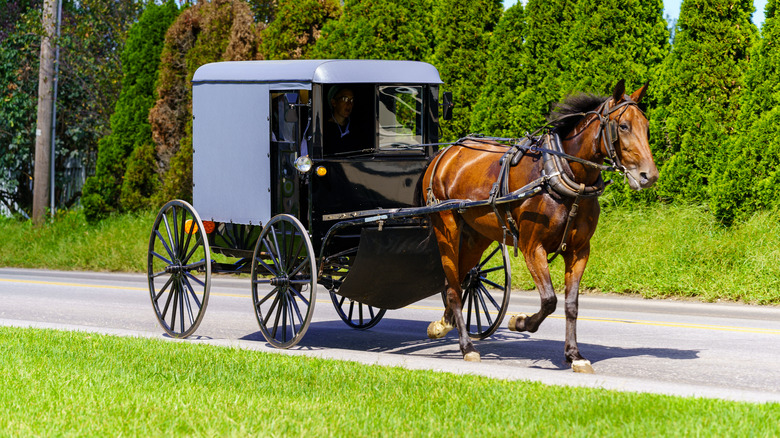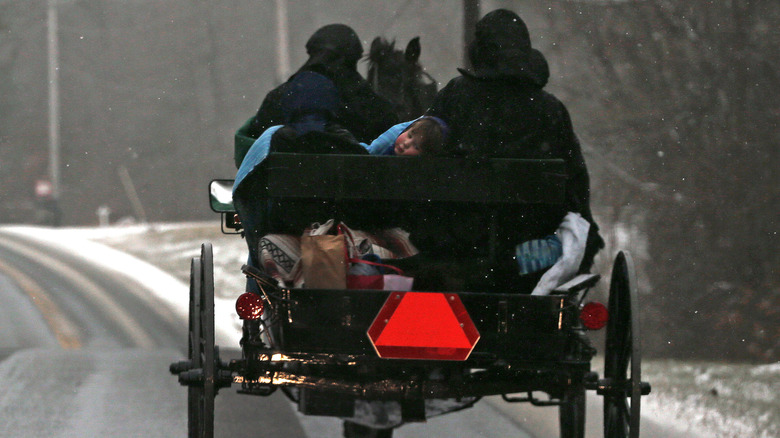The Amish Beard-Cutting Attacks Explained
For centuries, the Amish have lived in a sort of parallel universe to the rest of American society. While the latter group has embraced technological innovation and integration with society as a whole (both locally and globally), the Amish, in keeping with their beliefs, have kept to themselves, according to Britannica, avoiding contact and entanglements with outside society as much as is humanly possible. Further, the group are committed pacifists, steadfastly avoiding conflict to the point of even avoiding pressing criminal charges on the rare occasions when they're victims of crimes.
In fact, for a while in 2001, some members of Amish communities in Ohio and neighboring states were victimized by a bizarre series of hate crimes in which men had their beards forcibly cut off (and some women had their hair forcibly removed). What's more, the man who ordered (or at the very least, looked the other way at) those attacks is himself Amish, and he claimed he did it because the victims weren't Amish enough for his standards, according to Anabaptist World. Further, he tried (and failed) to convince a court that his crimes were perfectly legal because they were religious in nature and, thus, constitutionally protected.
Not all Amish are the same
Before going deeper into this story, it bears noting that there is no one set of doctrines and practices that govern all Amish everywhere. There is no Amish pope, so to speak, and no headquarters, and each community effectively lives according to its own principles. That means that some will be more traditional and conservative than others, will eschew modern technology to varying degrees. Indeed, some Amish communities even drive cars, according to the Milwaukee Journal Sentinel.
This set of differences between the varying Amish communities was a source of consternation to an Amish man by the name of Samuel (Sam) Mullet who, according to Anabaptist World, regularly railed against the comparatively freewheeling ways of nearby Amish communities, and who himself founded and ran his own community, the Bergholz Community, which was far stricter and more traditional. Indeed, the intensely strict way of life in Mullet's society was attractive to certain families who were disillusioned with the freer ways of nearby communities.
An Amish cult
Mullet didn't just found and rule over a strict Amish community: he ran it in much the same way that other religious zealots, such as Warren Jeffs of the Fundamentalist Church of Latter-Day Saints, run their cults. Indeed, as his grandson Dan Shrock told Al Jazeera, Mullet used many of the same abusive cult practices in Bergholz. For example, he was accused of being sexually and physically abusive to female members of the community, including his own relatives. Men who displeased him were sent to live in chicken coops, while Mullet took sexual liberties with their wives, another grandson told Anabaptist World. Mullet would admit that his actions were sinful, but he was intoxicated by the control. "I'm getting a lot of power by committing these sins. I know it's wrong, but I'm getting a lot of power," he reportedly said.
Taking another page from the cultist's playbook, Mullet also started carrying out what he considered divinely ordained vengeance. For some adults who displeased him, including some from other communities, Mullet's followers would retaliate against them by forcibly holding them down and shaving their beards or, when it came to women, their hair. Such attacks cut to the soul of the victims' identities, as for many, they had been growing their hair, facial or otherwise, for decades. Indeed, for many Amish men, anything short of a lengthy beard is considered a sign of shame and disgrace.
Uncooperative victims
Initially, victims of Mullet, or the men who acted on Mullet's orders, were reluctant to report these crimes to the police or otherwise cooperate with investigators, in keeping with the Amish commitment to avoiding entanglements with outside society, as well as the group's teachings on forgiveness. However, as the FBI reports, eventually the victims started cooperating because they didn't want these attacks to continue, and didn't want to see other people be victimized. Meanwhile, according to WFMJ, Amish people in three states were so fearful of a beard or hair attack by Mullet or his men that some even bought guns for protection.
The nature of these crimes also presented a problem for the authorities, according to Al Jazeera: is it possible for someone to commit a hate crime against their own people? Fortunately, prosecutors were able to argue that it was, indeed, possible for a person to be responsible for hate crimes against their own people, and soon enough, Mullet and some of his men were behind bars. Indeed, Mullet got the harshest sentence of all, being sentenced to 15 years in prison, when he was already 67 years old.
Sentences reduced
Mullet was not keen to accept his fate, do his time, and move on with his life. By 2015, according to The Associated Press, he'd convinced U.S. District Judge Dan Polster to re-sentence him, alleging a variety of technicalities in his trial. The judge agreed, and cut his sentence from 15 years to 10 years and nine months.
Meanwhile, according to the Cleveland Plain Dealer, Mullet tried to appeal all the way to the United States Supreme Court. However, that body refused to hear his case.
Mullet wasn't done appealing, however. By 2018, he'd already filed and lost at least one appeal, and when that failed, filed another. Specifically, Mullet and his lawyers alleged a series of technicalities, including that the jury was given improper instructions, that a witness acted improperly, and that prosecutors improperly alleged sexual misconduct even though that wasn't what Mullet was being tried for. For these reasons, he asked for his convictions to be overturned and to be given a new trial. However, it would all be moot, as in a few years, he would be free.
Sam Mullet is a free man
In much the same way that Warren Jeffs continues to hold sway over his cult even from behind bars, as A&E notes, Sam Mullet was able to manage his own cult from prison, his grandson told Al Jazeera in 2014. Specifically, Mullet would receive visitors in prison and direct them in carrying out his will in the community on the outside. Indeed, so strong was his influence, even from behind bars, that other victims continued to be silent, owing to the control he has over their minds, alleges his grandson.
As it turns out, Mullet was indeed released from prison in 2020, although for reasons that had nothing to do with his conviction being overturned. As the Cleveland Plain Dealer reported at the time, the Bureau of Prisons went through something of a purge while the COVID-19 pandemic was raging, moving at-risk prisoners, such as the elderly (to include Sam Mullet) into alternative forms of incarceration. Mullet was allowed to spend the remainder of his sentence under house arrest, rather than behind bars. At the time, he was due to be released in January 2021. There have been no public updates as of this writing.





